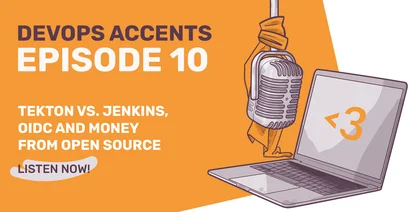Tekton vs. Jenkins, OIDC and Money from Open Source |🎙️#10

In this episode of DevOps Accents, Leo, Pablo and Kirill talk about Open Source and how companies make profit around it.
- Is Tekton still relevant?
- Why one company would make two similar products instead of investing in one?
- Is the idea of Open Source a little bit dodgy?
- Who makes money from Terraform and how?
- Building commercial projects on top of Open Source;
- Are you allowed to contribute to Open Source as a company employe?
You can listen to episode 10 of DevOps Accents on Spotify, or right now:
In this comprehensive exploration, we delve into the significant shifts and discussions within the DevOps community, particularly focusing on the evolution of open-source projects and their implications on technology and business practices. The dialogue sheds light on several pivotal aspects, including the lifecycle of technologies, the sustainability of open-source projects, and the commercialization strategies that drive the open-source ecosystem.
The Lifecycle of DevOps Technologies
The DevOps landscape is perpetually evolving, with new technologies emerging and existing ones maturing or fading into obscurity. This dynamic nature was illustrated through the journey of Tekton, a project initially embraced with enthusiasm but whose buzz has somewhat diminished over time. Unlike its counterpart, Argo CD, which has seen a surge in adoption and remains a hot topic, Tekton's visibility and perceived value within the community have waned, raising questions about the lifecycle of technologies in the DevOps arena.
The Sustainability of Open Source Projects
A critical concern for the DevOps community is the sustainability of open-source projects. As these projects rely heavily on the contributions of developers and the support of corporations, their viability can be threatened when interest wanes. This scenario was highlighted by the challenges faced by Tekton, which, despite its initial promise, has seen a decrease in community engagement and contributions. The discussion points to a broader issue within the open-source ecosystem: the need for ongoing support, development, and engagement to ensure the longevity and success of these projects.
Commercialization and Open Source
The conversation also ventured into the commercialization of open-source projects, a topic of significant relevance in today's technology landscape. Through examples like Terraform and Elasticsearch, the dialogue illustrated how companies have successfully built business models around open-source technologies, offering managed services, support, and proprietary features. However, this approach raises questions about the essence of open-source and the balance between community contributions and commercial interests.
Key Takeaways for the DevOps Community
- Lifecycle Awareness: DevOps professionals must remain agile, adapting to the ever-changing landscape of technologies and tools. Understanding the lifecycle of technologies can help in making informed decisions about adoption and investment.
- Open Source Sustainability: The community must actively engage in supporting open-source projects, whether through contributions, sponsorship, or advocacy, to ensure their continued relevance and development.
- Navigating Commercialization: While commercialization offers a pathway for sustaining open-source projects, it's crucial for the community to critically assess the implications of such models on the open-source ethos and accessibility.
As we reflect on these discussions, it's clear that the intersection of technology evolution, open-source sustainability, and commercialization strategies presents both challenges and opportunities for the DevOps community. By fostering a balanced approach that respects the principles of open source while embracing innovation and commercial viability, the community can continue to thrive and drive forward the development of impactful technologies.
Podcast editing: Mila Jones, milajonesproduction@gmail.com
